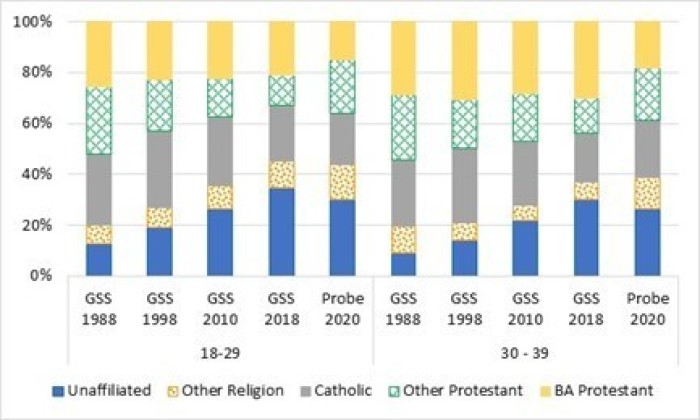Sadly, no, young adults are not returning to church
A famous movie phrase is: “If you build it, they will come.” But Christians have built over 350,000 churches but there isn’t much evidence that millions in the emerging generations will come back to church.
A recent Christian Post article predicted that, “More than 25% of regular churchgoers have no plans to go back just yet” based on a recent AP-NORC poll.[1] Their reasons for staying home range from COVID concerns to convenience. To many of these Christians, it may seem easier to stay home and worship online. Others will probably miss church altogether. Hebrews 10:25 makes it clear the attending church is not optional.
An important question is whether the younger generations will ever come back to church. At Probe Ministries, we have been studying this issue and doing surveys for more than a decade. A previous survey, the 2010 Probe Culturally Captive Christians survey, was limited to born-again Americans ages 18-40. The latest Probe Survey of Religious Views and Practices surveyed more than 3,100 Americans ages 18 to 55. The responses allowed us to make meaningful comparisons with our 2010 results while also comparing the beliefs of born-again Christians with those of other religious persuasions.
Religious affiliations of young adults
The most dramatic change is the increase in the percentage of those who do not select a Christian affiliation. Some select another religion. Most considered themselves unaffiliated (those in this group are often referred to as “the nones” because they select atheist, agnostic, or nothing in particular on a survey).
Looking at General Social Survey (GSS)[2] data for those ages 18–29, the percentage has grown from 20 percent of the population in 1988 to over 45 percent of the population in 2018. Some of this is due to embracing another religious faith (7 percent to 10 percent). Most of this is due to becoming unaffiliated. In fact, the unaffiliated almost tripled from 13 percent to 35 percent of the population.
Will the unaffiliated return to Church?
One of the assumptions many Christians have made in the past is that young people who leave the church will eventually return when they marry and have children. We do know that upon high school graduation, a significant portion of young people take a break from church as they head to college, the military, or the workforce. Some Christian leaders have tried to assure us that this emerging generation will once again return to church.
The best way to determine if these maturing, young adults will return to church is to look at two related metrics:
1. As a generational cohort ages, is the number of unaffiliated rising or falling? If it is falling, then possibly some are returning to the faith of their youth.
2. As the same generational cohort ages, is the number of born-again Christians[3] rising or falling? If it is rising and the unaffiliated are falling, then some are returning to faith or new people are accepting faith.
By combining these two metrics, we can accurately determine whether young adults are returning as they mature. If metric one is falling and metric two is rising, then some significant portion of these young people are returning. If metric one is rising and metric two is falling, then we can be confident that there is no significant movement to return to Christian beliefs and practices.

Are the unaffiliated rising or falling as young adults age?
Looking at the chart above, we find that 26 percent of those in their twenties were unaffiliated in 2010, growing to 30 percent of those in their thirties in 2018. This result means that more of the people in their twenties became unaffiliated in their thirties. They aren’t returning to church to raise their families. They are leaving the church (becoming unaffiliated).
It is also worth mentioning that millions in the emerging generation never went to church in their youth. It is even less likely they will “return to church” since that assumes they ever attended religious services in the first place.
Some have proposed that it might be possible that many of the unaffiliated are actually involved Christians who do not want to affiliate with an evangelical viewpoint. Our surveys show that very few of the unaffiliated state that they have Christian beliefs and practices.
Are born-again Christians rising or falling as young adults age?
Our survey analysis shows that the percentage of born-again Christians is continuing to fall as young adults age. To show this trend, let’s look at four different metrics:
- Affiliate as Christian and have had a born-again experience
- Born-again Christians who attend church multiple times in a month
- Born-again Christians who read their Bible at least once a week
- Born-again Christians who ascribe to four key biblical beliefs addressing the nature of God, the way to salvation, the reliability of the Bible, and the life of Christ
For each of these metrics, we want to look at the percent of the 18- to 29-year-old population in 2010 and the percent of the 30- to 39-year-old population in 2020. What we found is:
- In 2010, we found 27 percent of those ages 18 to 29 who classify as born-again Christian. In 2020, the same age cohort ten years later, now ages 30 to 39, shows the percentage of born-again Christians has dropped to 22 percent of the age group.[4]
- Attending church multiple times a month: drops from 17 percent to 9 percent of the population.
- Reading their Bible at least once a week: drops from 14 percent to 10 percent of the population.
- Ascribing to four key biblical beliefs: drops from 12 percent to 5 percent of the population
Based on our survey, we can confidently report that fewer people are holding to a born-again Christian belief set and practices as the young adult cohort ages.
The data is clear. The unaffiliates are rising and born-again Christians with an active faith are declining. Thus, we can deduce maturing, young adults are not returning to faith as they move into their thirties.
How can we respond?
Pastors should not assume that their congregation holds to basic biblical beliefs. They need to teach basic theology. And the problem isn’t always with the pastor. We have done surveys inside churches only to find that even when the pastor is teaching biblical doctrine and principles, the congregation does not have a biblical worldview.
We also need to prepare our young people for a hostile, secular world. Consider sending high school students to the Probe Ministries Mind Games camp to equip them to confront the false teachings they will encounter at college and in society at large.
Young people today need church preaching and teaching that applies biblical truth in a relevant way to their lives. Some outside the church may be hostile to the Bible and Christianity. But most young people are just apathetic about going to church. They don’t think it has any relevance to the way they live their lives. We need to help them make those connections.
Young people today also say they are looking for authenticity. Often that is a buzzword, but it is a way of expressing a desire to know that people they meet are real and authentic. We also need to model that within the church congregations.
The emerging generation has been living in a world with a pandemic, then lockdowns, then race riots, then political polarization, and now economic uncertainty. They may not be looking to churches for answers, but if they believe the biblical teaching has answers and biblical fellowship provides community, they will come.
The Probe survey results and reports can be found at www.probe.org
[1] Leonardo Blair, “More than 25% of regular churchgoers have no plans to go back just yet: poll,” July 1, 2021, https://www.christianpost.com/news/some-churchgoers-still-have-no-plans-to-go-back-just-yet-poll.html
[2] General Social Survey data was downloaded from the Association of Religion Data Archives, www.TheARDA.com, and were collected by the National Opinion Research Center.[3] We define a Born Again Christian as one who answered the questions: (1) Have you ever made a personal commitment to Jesus Christ that is still important in your life today? Answer: YES, (2) What best describes your belief about what will happen to you after you die? Answer: I will go to heaven because I confessed my sins and accepted Jesus Christ as my savior.
[4] Using GSS data for 2010 and Probe data for 2020 (but we also looked at GSS data for 2018).
Steve Cable is Senior Vice President for Probe Ministries and author of the book, Cultural Captives: The Beliefs and Behavior of American Young Adults. His email is: [email protected].
Kerby Anderson is President of Probe Ministries, host of the Point of View radio talk show, and author of twenty books. His email is: [email protected].




























